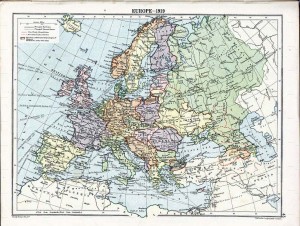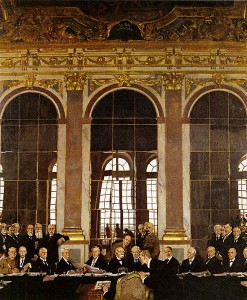

The Anglo-German Naval Agreement was signed on June 18, 1935 by Germany and Great Britain. It was a bilateral understanding between Great Britain and Germany which governed the size of Germany’s Kriegsmarine, or navy. The agreement limited the Kriegsmarine to 35% of the size of Great Britain’s Royal Navy based on tonnage. The Anglo-German Naval Agreement was registered in the League of Nations Treaty Series on July 12, 1935 and persisted until April 28 of 1939, when Adolf Hitler renounced it.
The Anglo-German Naval Agreement was an attempt to improve the relationship between Germany and Great Britain. The Germans regarded the agreement to be the start of an alliance against Soviet Union and France. For Great Britain, however, it was meant to be the beginning of arms restriction arrangements which were designed to restrict Germany’s expansion. This agreement was considered very controversial by many other nations as the tonnage ratio granted Germany the authority to produce a navy far larger than the Treaty of Versailles had permitted. It was also made without prior consultations with Italy or France.
Hitler appointed Joachim von Ribbentrop to lead the naval delegation on March 27, 1935. Ribbentrop had served as the Extraordinary Ambassador-Plenipotentiary and as the head of the Nazi Party organization called the Dienststelle Ribbentrop. German Foreign Minister, Baron Konstantin von Neurath, was the first to oppose this agreement. However, he changed his mind after he decided that Great Britain would not agree to the tonnage ratio.
On May 22, 1935, Great Britain’s Cabinet voted to accept Hitler’s offers at the earliest opportunity. The British Ambassador for Germany, Sir Eric Phipps, advised them not to ignore the chance to reach an agreement with Hitler. British Admiral Chatfield also believed the agreement should be seriously considered regardless of what France’s reaction would be.
Ribbentrop went to London on June 2, 1935, for the talks that began on June 4, 1935. The discussions were held at the British Admiralty office with Foreign Secretary Sir John Simon heading the British delegation and Ribbentrop leading the German delegation. Ribbentrop was very determined to be successful in his mission, and started his discussions by declaring that Great Britain needed to accept the thirty-five to one hundred tonnage ratio as “fixed and unalterable.” He claimed that if they didn’t, his German delegation would return home immediately and that Germany would start to build their navy to any capacity they wanted.
Simon was not pleased with Ribbentrop’s conduct, and said these types of statements were contrary to normal negotiation talks before leaving the negotiations. However, a couple of days later on June 5, 1935, the British delegation changed their minds. Simon had discussed things with the British Cabinet, which thought the agreement could be in their best interest, and Simon was instructed to go ahead and accept the offer from Hitler while it was still on the table. They were afraid that Hitler might withdraw his offer and start building up the German Navy much higher than their proposed level. Great Britain knew, because of past history, that Germany could quickly have the same naval capacity as them.
Talks continued on June 5, 1935, between Sir Robert Craigie, a naval expert from the British Foreign Office, and Admiral Karl-Georg Schuster, a deputy for Ribbentrop. The Germans said the ratio numbers would be tonnage ratios only, and that Germany would build up their tonnage levels to what Great Britain’s tonnage levels were in the various warship categories. That afternoon, the British Cabinet agreed to accept the proposed tonnage ratio, and that evening Ribbentrop was informed of the Cabinet’s intention. Throughout the next couple of weeks, the ongoing talks in London worked to sort out numerous technical issues, most of which related to exactly how the tonnage ratios were to be determined for the different warship categories.
Ribbentrop was very eager for success, and ended up agreeing to nearly all of the demands made by Great Britain. The Anglo-German Naval Agreement was formally agreed to on June 18, 1935, and signed by Ribbentrop, and Sir Samuel Hoare. Hitler was very pleased with the agreement and called June 18th of 1935 a great day as he was under the impression that the agreement was the start of a new and successful Anglo-German alliance.
Though many considered this to be a good illustration of Great Britain’s appeasement policy, most members of the British Parliament believed the agreement would maintain Britain’s standing as the world’s most dominant naval power. However, many of them overlooked the fact that they would have to defend their world empire, while Germany’s naval fleet would only have to protect their home ports.
In the end, Anglo-German Naval Agreement let Germany build up to twenty-one cruisers, sixty-four destroyers, and because of a translation error or a mis-phrasing in the agreement, they were allowed to build as many U-boats as they wanted. Churchill claimed that the agreement was one-sided and that Britain had essentially approved of Germany violating the Treaty of Versailles.
Germany had much to gain from the signing of this agreement. Since most of their iron imports came from Scandinavia, and they needed ships to transport the ore so they could increase their war production. Germany also benefited in that they were allowed to build submarines, something that the Treaty of Versailles had strictly prohibited.
It was believed by naval experts from Great Britain and Germany that the Kriegsmarine would reach the tonnage limitations, at the earliest, by 1942. This did not happen for several reasons including design problems, insufficient shipbuilding space, skilled labor shortages, and insufficient funds for raw materials. Germany’s main priorities were the Luftwaffe and the Wehrmacht.

France was angered by Great Britain’s resolve to free the Germans from the Treaty of Versaille’s constraints. They believed that Great Britain had done so out of personal gain, as Germany’s fleet would be very close to the French coast. The French concluded that Great Britain was not concerned about France’s welfare in the least.
Because the agreement allowed Germany build more warships than some of the western nations had, the French considered this agreement to be treachery. They stated it was more appeasement towards Hitler, and they believed Hitler’s appetite would only grow larger because of it. France believed that Great Britain did not have the legal right to absolve the Germans from abiding by the naval restrictions set forth in the Treaty of Versailles.